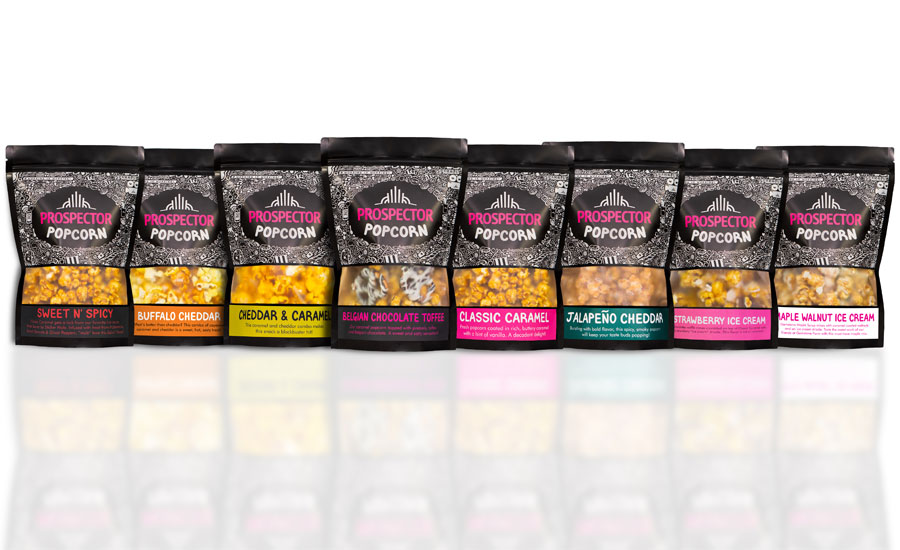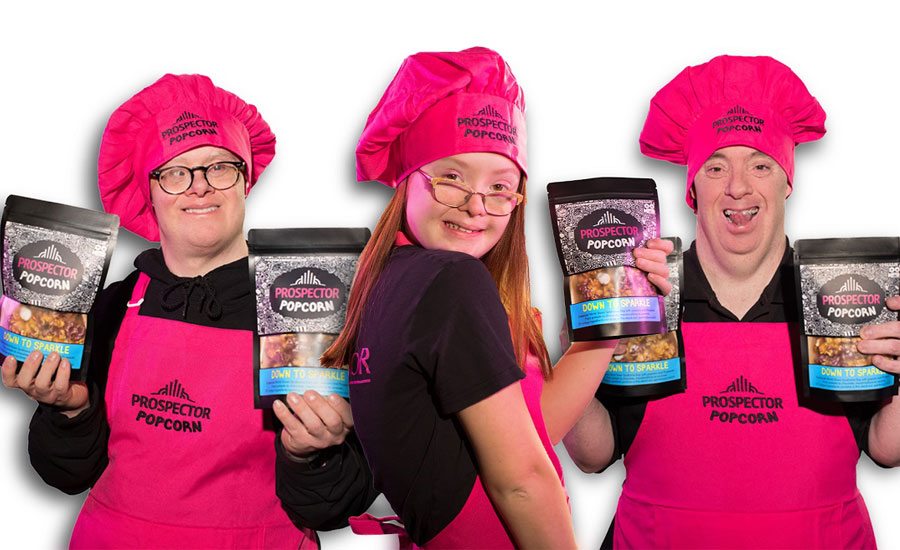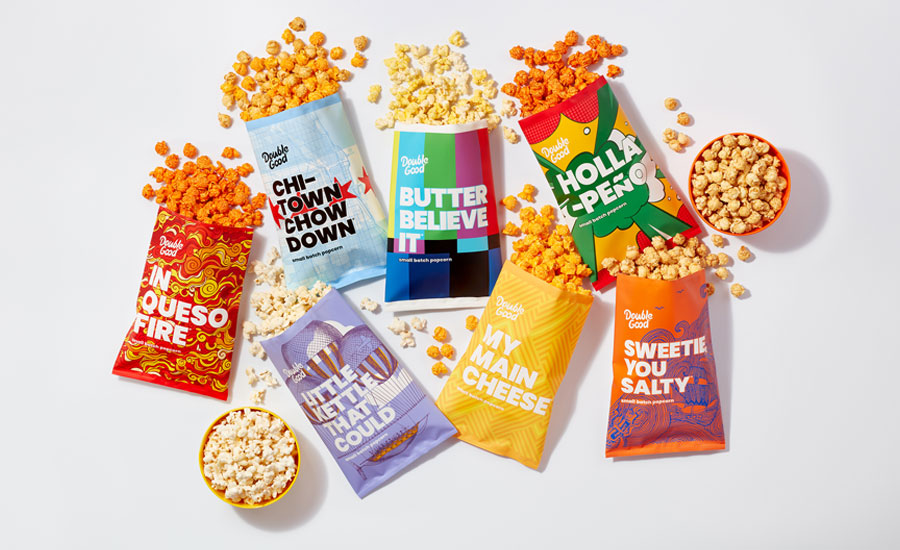State of the Industry 2024: Popcorn popularity persists
The category has had highs and lows, but consumers keep munching on the snacks.

Courtesy of Prospector Popcorn
Snack sales may go up, they may go down (the popcorn category had a bit of both over the past year), but whatever happens, according to Meredith Schaffner of popcorn producer Double Good, the snack business is always interesting.
“The snacking landscape is one of the most fun food categories to be in, because it is constantly evolving,” she remarks. “Snacking is one place where consumers love to play around with new combinations, and we see a lot of creativity from our consumers in different flavors they like to mix together.”
Market data
Ready-to-eat popcorn took in $2.1 billion in dollar sales for the 52-week period ending April 21, 2024, according to Circana (Chicago); that figure represents a modest decline of 2.7% compared to the year before. Leaders in the category include two familiar powerhouses: Frito-Lay’s Smartfood brand raked in $571.1 million for the time period (a decline of 3%), while Hershey’s SkinnyPop popcorn brought in $445.9 million (down 5.8%). The most impressive gain in the category went to LesserEvil, whose $65.4 million in sales constituted an impressive 85.8% gain compared to the previous year.
Microwave popcorn also had some ups and downs; overall, the subcategory took in $977.5 million, down 4.7% compared to the previous period. Conagra brand Orville Redenbacher’s line of products stood highest among ranked brands; it amassed $306.7 million for the period, a decline of 7.3% over last year. Act II sold $230.1 million worth of its items, which constitutes a 2.1% increase over its sales from the previous year. Pop Secret was among the double-digit declines in sales for the time period; its intake of $176.8 million represented a loss of 10.8% compared to the year before.
Looking back
According to Schaffner, producers that have fun with their flavors can see their experimentation pay off.
“At Double Good, we carry the tried and true flavors, like Butter Believe It and My Main Cheese, but we also explore more unique flavors like Sweetie you Salty (Salted Caramel) and Easy Peasy Caramel Cheesy,” she states. “A bright spot we’ve seen is the cult following our In Queso Fire flavor has earned on social media—the customers that love In Queso Fire aren’t shy about sharing it on TikTok and Instagram.”
On the other hand, sometimes familiar flavors also draw attention (and sales).
“We launched our first new flavor in years—a ranch popcorn flavor called Home on the Ranch,” shares Schaffner. “We’d been following the craze around ranch for some time, and noted how hugely popular it’s become in recent years, moving beyond salads to become a popular dip for everything from chicken to pizza. We felt popcorn was a great way to celebrate the herby and creamy profile of ranch, and consumers have definitely responded well to the flavor.”
Adam Ingberman, director of digital marketing for Prospector Popcorn—a brand that offers an array of employment opportunities to people with disabilities—says he’s seen a rise in the better-for-you snack options.
“We see a significant shift towards healthier snack options over the past year; the market is seeing lots of products that are lighter and offered in smaller portions, catering to the health-conscious snackers,” he observes. “This trend presents a unique challenge for us as a relatively new national brand specializing in indulgent and comfort snacks.
While popcorn often is a quick, convenient snack for on-the-go occasions, there are other purposes premium popcorn can serve. For example, according to Ingberman, popcorn products with high-end ingredients, eye-catching packaging, or a mission behind the munchies can turn popcorn into a suitable present.


“We have found that our unique gourmet popcorn is often purchased as a gift, which highlights the importance of novelty and uniqueness in consumer purchasing decisions,” he notes. “Consumers might buy our popcorn for themselves and their pantries a few times every six months, but they frequently return to purchase it as a gift for others. The novelty factor plays a crucial role, as gift-givers seek out original products. This behavior suggests a strong market for premium, unique snack items that offer a memorable experience for both the buyer and the recipient.”
Not surprisingly, popcorn has faced some of the same challenges other snack producers have wrestled with in the past year. According to Ingberman, ingredients and material costs are among the obstacles.
“One challenge we have faced is the rising cost of chocolate, which impacts our product costs significantly; although we do not monitor these prices week over week, periodic reviews reveal substantial increases,” he notes. “Managing these costs while maintaining product quality and price points is a continuous challenge, requiring strategic sourcing and cost management practices. We never compromise on our chocolate in terms of quality and quantity.”
Looking ahead
Producers largely express a rosy outlook for the category’s sales in the road ahead.
“We are optimistic about the category's growth prospects,” predicts Ingberman. “Industry data suggests a continued upward trend, particularly driven by the healthy snack segment. This growth trend provides an opportunity for our comfort snack category to gain more market share as consumers seek a balance between health-conscious options and indulgent treats.”
Schaffner suggests popcorn producers would be wise to keep the flavor heat turned up.
“Over the past year, the desire for spicy food has noticeably increased, and we expect this trend to not only continue but also evolve in exciting ways. One clear indication of this trend's momentum is the popularity of our own spicy flavors, such as In Queso Fire and Holla-Peño, which have garnered significant customer love. These flavors marry the heat of spices with the crunch of light, fluffy popcorn, creating a delightful and craveable taste experience.”
Further, Schaffner says, consumers are likely to continue clamoring for popcorn that brings the sweet heat.

“The rise of ‘swicy’ combinations, which blend sweet and spicy flavors, is capturing consumer interest with its dynamic and balanced taste profile,” she muses. “Alongside this, the incorporation of global flavors and ingredients is also gaining momentum. Consumers are becoming more adventurous, seeking bold tastes from around the world. These international spices not only add heat but also introduce complex, layered flavors, enriching the snacking experience.”
Challenges in snack production likely will persist, Ingberman says, though those can be mitigated by thinking ahead.
“Supply chain sluggishness, particularly longer lead times for certain materials, will continue to be a challenge,” he says. “We manage this with better planning where we can. In our own lives, Amazon has trained us to want two-day shipping. Not so much in our business space—it doesn’t work that way, of course. Our proactive approach, while more work, is essential to meet our customers’ needs.”
In addition to continued interest in BFY snacking, and a balance between healthful and indulgent eating, Ingberman says products with a purpose could also enjoy an advantage with mission-minded munchers.
Looking for a reprint of this article?
From high-res PDFs to custom plaques, order your copy today!






